
APPLIED CATALYSIS A-GENERAL
Scope & Guideline
Exploring the Frontiers of Catalysis and Process Chemistry.
Introduction
Aims and Scopes
- Catalyst Development and Characterization:
Research on the synthesis, modification, and characterization of catalysts, including metal, metal oxide, and hybrid materials, aimed at improving catalytic performance in various reactions. - Catalytic Processes and Mechanisms:
Studies focusing on the understanding of catalytic mechanisms, kinetics, and the role of active sites in different catalytic processes, including oxidation, hydrogenation, and CO2 conversion. - Environmental Applications:
Research addressing the use of catalysts for environmental remediation, including the degradation of pollutants, CO2 reduction, and sustainable production of chemicals and fuels. - Photocatalysis and Electrocatalysis:
Exploration of photocatalytic and electrocatalytic systems for energy conversion and chemical transformations, including solar-driven processes and hydrogen production. - Biomass Valorization:
Investigations into catalytic strategies for converting biomass-derived feedstocks into valuable chemicals and fuels, focusing on green chemistry principles.
Trending and Emerging
- Sustainable and Green Catalysis:
Research focusing on the development of catalysts that facilitate environmentally friendly processes, including the use of renewable feedstocks and energy-efficient methodologies. - Catalyst Design Using Machine Learning:
An increasing trend towards employing machine learning and artificial intelligence techniques for the design and optimization of catalysts, enhancing the efficiency of catalyst discovery. - Electrocatalysis for Energy Applications:
Growing interest in electrocatalytic processes for energy conversion, particularly for hydrogen production and CO2 reduction, aligns with global efforts towards sustainable energy solutions. - Photocatalytic CO2 Reduction:
Significant research is emerging around photocatalytic systems aimed at converting CO2 into valuable hydrocarbons, driven by the need to mitigate climate change. - Metal-Organic Frameworks (MOFs) in Catalysis:
The utilization of MOFs for catalysis is on the rise due to their tunable structures and high surface areas, making them versatile candidates for various catalytic applications.
Declining or Waning
- Traditional Catalyst Recycling:
Research on conventional methods of catalyst recycling has seen a decline as newer, more efficient methods and materials, such as hybrid and nanostructured catalysts, are being developed. - Single-use Catalysts for Bulk Chemicals:
The focus on single-use catalysts for large-scale production of bulk chemicals is decreasing, particularly as sustainability and recycling become more critical in catalysis research. - Homogeneous Catalysis in Industrial Applications:
Interest in homogeneous catalysts for industrial applications appears to be waning in favor of heterogeneous systems, which offer easier separation and recycling. - Conventional Metal Catalysts:
The exploration of traditional noble metal catalysts is gradually declining as researchers shift towards alternative and more sustainable catalytic materials, including non-noble metals and metal-free catalysts. - Basic Research on Catalyst Fundamentals:
While fundamental studies are essential, there is a noticeable shift towards applied research with immediate industrial relevance, leading to a decline in purely theoretical investigations.
Similar Journals

JACS Au
Exploring the future of chemistry, one article at a time.JACS Au, published by the American Chemical Society, is a premier open access journal dedicated to advancing research in the rapidly evolving fields of analytical chemistry, organic chemistry, and theoretical chemistry. Since its inception in 2021, JACS Au has quickly established itself as a leading platform for high-quality research, reflected in its Q1 rankings across multiple categories for 2023, including Organic Chemistry and Analytical Chemistry. The journal focuses on innovative methodologies and applications that drive the discipline forward, making it an essential resource for researchers, professionals, and students alike. With an impressive Scopus ranking, consistently placing in the top tiers of its categories, and offering a broad range of access options for its readership, JACS Au aims to foster collaboration and disseminate transformative ideas that impact the global scientific community. Exploring diverse topics within chemistry, this journal provides a vital conduit for sharing groundbreaking research and enhancing scientific dialogue.

CATALYSIS REVIEWS-SCIENCE AND ENGINEERING
Unleashing Innovation in Catalysis and EngineeringCATALYSIS REVIEWS - SCIENCE AND ENGINEERING, published by Taylor & Francis Inc, is a leading journal in the field of catalysis, providing a vital platform for the dissemination of rigorous research and comprehensive reviews from 1968 to the present. With an impressive Q1 ranking in multiple categories, including Catalysis and Chemistry, this journal stands out as an essential resource for professionals, researchers, and students alike. Its high impact factor and esteemed Scopus ranks — including 3rd in Chemical Engineering: Process Chemistry and Technology — highlight the journal's influence and prestige within the scientific community. While primarily a subscription-based publication, the journal’s commitment to advancing the understanding of catalytic processes continues to foster innovation in various industrial applications, making it indispensable for anyone engaged in the fields of chemical engineering and applied chemistry.
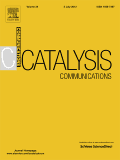
CATALYSIS COMMUNICATIONS
Innovating Tomorrow's Chemical Solutions TodayCATALYSIS COMMUNICATIONS is a prestigious journal published by Elsevier, focusing on advancements in the field of catalysis, an essential component of chemical engineering and process technology. With an ISSN of 1566-7367 and an E-ISSN of 1873-3905, this journal is dedicated to the rapid publication of original research and innovative findings that drive progress in catalysis. Recognized for its quality, CATALYSIS COMMUNICATIONS holds a Q2 ranking within the categories of Catalysis, Chemistry (miscellaneous), and Process Chemistry and Technology as of 2023, positioning itself in the upper tier of scholarly publications in its field. The journal has made significant contributions to the scientific community since its inception in 2000, with ongoing research until 2024. While it currently operates without an open-access option, the platform ensures rigorous peer review, maintaining high standards for publication. By engaging with the latest research, CATALYSIS COMMUNICATIONS serves as a vital resource for researchers, professionals, and students, fostering innovation and collaboration in chemical sciences.
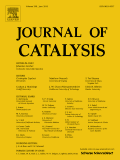
JOURNAL OF CATALYSIS
Leading the Charge in Catalytic InnovationJOURNAL OF CATALYSIS, published by Academic Press Inc, Elsevier Science, is a premier peer-reviewed journal that has been at the forefront of research in catalysis since its inception in 1962. With an impressive impact factor and ranking in the top quartiles of both catalysis and physical and theoretical chemistry, the journal is highly regarded, currently holding the distinction of Q1 in both fields. The journal serves as a critical platform for disseminating groundbreaking research, innovative methodologies, and theoretical advancements, making it essential reading for researchers, professionals, and students alike. Although it does not operate under an open-access model, its robust content is accessible through institutional subscriptions, ensuring that significant findings in catalysis and related fields reach a wide audience. With convergence years extending to 2024, JOURNAL OF CATALYSIS continues to shape the discourse in catalysis and chemical engineering, encouraging scholarly exchange and collaboration worldwide.

Reaction Kinetics Mechanisms and Catalysis
Exploring the Frontiers of Catalysis and KineticsReaction Kinetics Mechanisms and Catalysis is an esteemed academic journal published by SPRINGER, specializing in the fields of catalysis and physical and theoretical chemistry. With ISSN 1878-5190 and E-ISSN 1878-5204, this journal serves as a crucial platform for researchers and professionals to disseminate and engage with cutting-edge findings in reaction kinetics, catalytic processes, and mechanistic insights. Operating under an open access model, the journal ensures broad accessibility to its content, enhancing its impact within the scientific community. As of 2023, it is positioned in the Q4 category in catalysis and Q3 in physical and theoretical chemistry, reflecting its growing influence, yet also its potential for further advancement. Aiming to foster collaborations and innovations, Reaction Kinetics Mechanisms and Catalysis is poised to continue shaping the discourse in its field, making it an essential read for researchers, students, and industry professionals alike.
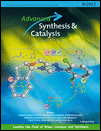
ADVANCED SYNTHESIS & CATALYSIS
Pioneering breakthroughs in synthesis and catalysis.ADVANCED SYNTHESIS & CATALYSIS is a prestigious academic journal published by Wiley-VCH Verlag GmbH, based in Germany. This journal, with ISSN 1615-4150 and E-ISSN 1615-4169, plays a pivotal role in the fields of Chemistry and Chemical Engineering, earning commendable rankings such as Q2 in Catalysis and Q1 in Organic Chemistry in 2023. Its high impact factor and recognition—ranking #18 in both Organic Chemistry and Catalysis—further underscore its significance as a platform for groundbreaking research and innovative methodologies. Spanning from 1996 through 2024, ADVANCED SYNTHESIS & CATALYSIS aims to disseminate high-quality, cutting-edge studies related to synthetic processes and catalytic technologies, ensuring accessibility via their open access options. By fostering a vibrant scholarly community, this journal serves as an essential resource for researchers, professionals, and students dedicated to driving advancements in synthetic and catalytic chemistry.
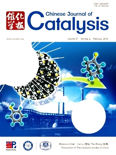
Chinese Journal of Catalysis
Empowering Scientists to Tackle Global Challenges through CatalysisWelcome to the Chinese Journal of Catalysis, a prestigious publication dedicated to advancing the field of catalysis. Published by Elsevier, this journal showcases groundbreaking research and developments in the chemistry of catalysis, emphasizing applications that address global challenges in energy, environment, and sustainability. Since its inception in 1996, the journal has gained recognition, achieving a remarkable impact factor and ranking in the top quartile (Q1) of both Catalysis and Chemistry disciplines as of 2023. With a Scopus ranking of #5 in Catalysis and #14 in General Chemistry, it serves as a vital resource for academia and industry professionals alike. Through its rigorous peer-review process, the journal disseminates high-quality research that not only fosters collaboration among scientists but also encourages innovation. Access to the journal is available through institutional subscriptions, ensuring wide-reaching dissemination of critical findings. Positioned within the vibrant research community in China and beyond, the Chinese Journal of Catalysis plays a pivotal role in shaping the future of catalytic science.
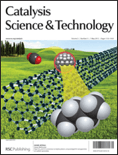
Catalysis Science & Technology
Unleashing Potential in Catalytic ProcessesCatalysis Science & Technology is a leading journal published by the Royal Society of Chemistry, dedicated to advancing the field of catalysis through high-quality research and innovation. Established in 2011, this journal serves as a vital platform for researchers, professionals, and students interested in the latest developments in chemical engineering and catalytic processes. With an impressive Q2 ranking in Catalysis for 2023, the journal is recognized for its significant contributions to the discipline, evidenced by its respectable Scopus Rank of #21 out of 68 in the category and a 69th percentile standing. The journal is committed to disseminating original research that enhances our understanding of catalysis, facilitating knowledge exchange and collaboration within the scientific community. Even without Open Access, Catalysis Science & Technology remains pivotal in shaping innovations that drive forward both academic inquiry and industrial applications, making it an essential resource for anyone involved in this dynamic field.

KINETICS AND CATALYSIS
Elevating the Standards of Catalytic ResearchKinetics and Catalysis is a pioneering journal dedicated to advancing the field of catalytic science and chemical kinetics, published by Pleiades Publishing Inc. Based in the Russian Federation, this journal serves as a critical platform for disseminating high-quality research related to the mechanisms of chemical reactions and innovative catalytic processes. Although currently not an open access journal, it maintains academic rigor through a comprehensive peer-review process that ensures the relevance and integrity of its published works. With a history dating back to 1968, Kinetics and Catalysis has evolved through various converged years, reflecting its commitment to interdisciplinary research within the realms of chemistry, catalysis, and the computational aspects of modeling and simulation. As evidenced by its Scopus rankings and quartiles, it stands as an influential, albeit niche, journal, appealing to researchers, professionals, and students eager to explore the intricacies of chemical transformations. The journal’s robust archive offers an invaluable resource for those seeking to expand their understanding of both theoretical and practical approaches to catalysis.

Chem Catalysis
Catalyzing innovation in chemistry research.Chem Catalysis is a leading academic journal published by CELL PRESS, specializing in the diverse and dynamic field of chemistry. Since its inception in 2021, this open-access journal has rapidly ascended to prominence, holding Q1 quartile rankings in prestigious categories including Chemistry (Miscellaneous), Organic Chemistry, and Physical and Theoretical Chemistry. With its Scopus rankings placing it in the top tiers—Rank #14 in Organic Chemistry and Rank #12 in Miscellaneous Chemistry—Chem Catalysis serves as a vital platform for disseminating innovative research and catalysis science. Researchers and professionals seeking to stay abreast of cutting-edge developments will find this journal indispensable for advancing their knowledge and contributions to the field. Located in Cambridge, Massachusetts, Chem Catalysis is committed to fostering collaboration and innovation in the chemical sciences, paving the way for breakthroughs that address global challenges.